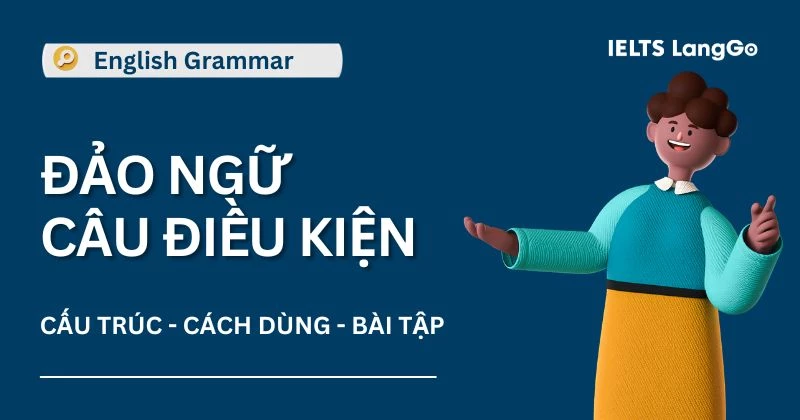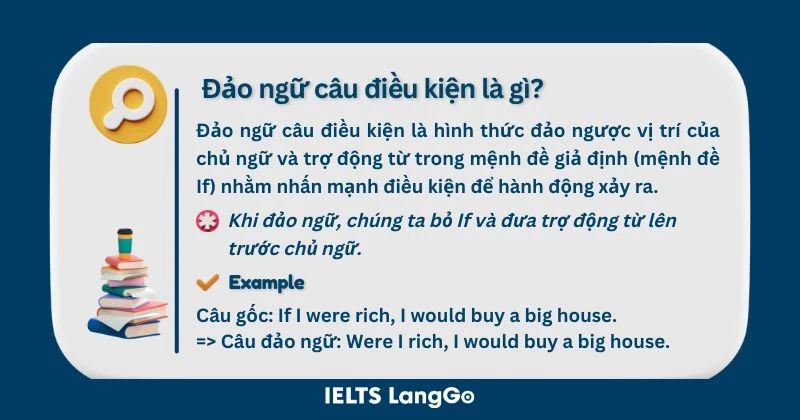


Đảo ngữ câu điều kiện là một chủ điểm kiến thức quan trọng giúp bạn sử dụng câu điều kiện trong tiếng Anh linh hoạt và hiệu quả hơn.
Trong bài viết này, IELTS LangGo sẽ giúp bạn hiểu rõ khái niệm, cấu trúc và cách sử dụng đảo ngữ câu điều kiện kèm ví dụ và một số bài tập để bạn có thể luyện tập ngay lập tức. Hãy cùng tìm hiểu thôi nào!
Đảo ngữ là phương thức thay đổi trật tự thông thường của chủ ngữ và động từ trong câu nhằm mục đích nhấn mạnh hoặc tăng tính biểu cảm.
Như vậy, đảo ngữ câu điều kiện (Inverted Conditional Sentence) là hình thức đảo ngược vị trí của chủ ngữ và trợ động từ trong mệnh đề giả định (mệnh đề If) nhằm nhấn mạnh điều kiện để hành động xảy ra.
Khi đảo ngữ, chúng ta bỏ If và đưa trợ động từ lên trước chủ ngữ.
Ví dụ
Câu gốc: If you should need any assistance, please contact our support team. (Nếu bạn cần bất kỳ sự trợ giúp nào, vui lòng liên hệ đội ngũ hỗ trợ của chúng tôi.)
=> Câu đảo ngữ: Should you need any assistance, please contact our support team.
Câu gốc: If I were rich, I would buy a big house. (Nếu tôi giàu, tôi sẽ mua một ngôi nhà lớn.)
=> Câu đảo ngữ: Were I rich, I would buy a big house.

Đảo ngữ trong câu điều kiện thường được dùng trong văn phong trang trọng hoặc ngữ cảnh học thuật, sử dụng đảo ngữ câu điều kiện sẽ giúp bạn:
Trong phần này, chúng ta sẽ cùng tìm hiểu chi tiết các dạng đảo ngữ của câu điều kiện kèm cách dùng và ví dụ cụ thể nhé.
Cách dùng: Đảo ngữ câu điều kiện loại 0 được sử dụng để nhấn mạnh một sự thật hiển nhiên, thường liên quan đến các định luật khoa học, vật lý, …
Cấu trúc:
|
| Cấu trúc gốc | Cấu trúc đảo ngữ |
| Với động từ To be | If + S1 + am/is/are (not) + Adj/N, S2 + V | Should + S1 + (not) + be + Adj/N, S2 + V
|
| Ví dụ | If she is not careful, she often makes mistakes. (Nếu cô ấy không cẩn thận, cô ấy thường mắc lỗi.) | Should she not be careful, she often makes mistakes. |
| Với động từ thường | If + S1 + (don’t/doesn’t) + V1, S2 + V2 | Should + S1 + (not) + V-inf, S2 +V2 |
| Ví dụ | If we leave a block of ice out of the freezer, it melts. (Nếu chúng ta để một khối đá ra khỏi tủ đông, nó sẽ tan chảy.) | Should we leave a block of ice out of the freezer, it melts. |
Cách dùng: Đảo ngữ câu điều kiện loại 1 thường dùng để thông báo cho người khác về những trường hợp, tình huống có thể xảy ra, hoặc cảnh báo người khác về một tình huống xấu.
Cấu trúc:
|
| Cấu trúc gốc | Cấu trúc đảo ngữ |
| Với động từ To be | If + S1 + am/is/are (not) + Adj/N, S2 + will/can/may/might + V-inf | Should + S1 + (not) + be + Adj/N, S2 + will/can/may/might + V-inf |
| Ví dụ | If the weather is bad, the game might be canceled. (Nếu thời tiết xấu, trận đấu có thể bị hủy.) | Should the weather be bad, the game might be canceled. |
| Với động từ thường | If + S1 + (don’t/doesn’t) + V1, S2 + will/can/may/might + V-inf | Should + S1 + (not) + V-inf, S2 + will/can/may/might + V-inf |
| Ví dụ | If you don’t study hard, you may not pass the exam. (Nếu bạn không học chăm chỉ, bạn có thể không vượt qua được kỳ thi.) | Should you not study hard, you may not pass the exam. |
Lưu ý:
Cách dùng: Đảo ngữ câu điều kiện loại 2 thường được dùng để đưa ra lời khuyên một cách lịch sự
Cấu trúc:
|
| Cấu trúc gốc | Cấu trúc đảo ngữ |
| Với động từ to be | If + S1 + were (not) + Adj/N, S2 + would/might/could + (not) + V-inf | Were + S1 + (not) + to be + Adj/N, S2 + would/might/could + (not) + V-inf |
| Ví dụ | If I were you, I would not accept that offer. (Nếu tôi là bạn, tôi sẽ không chấp nhận lời đề nghị đó.) | Were I you, I would not accept that offer. |
| Với động từ thường | If + S1 + V_ed, S2 + would/could + (not) + V-inf
| Were + S1 + to V, S2 + would/could + (not) + V-inf |
| Ví dụ | If she arrived late, she could miss the presentation. (Nếu cô ấy đến muộn, cô ấy có thể bỏ lỡ buổi thuyết trình.) | Were she to arrive late, she could miss the presentation. |
Lưu ý:
Cách dùng: Đảo ngữ câu điều kiện loại 3 nhấn mạnh sự tiếc nuối về một sự việc trong quá khứ: nếu sự việc đã diễn ra/không diễn ra như vậy thì kết quả đã khác đi.
Cấu trúc:
|
| Cấu trúc gốc | Cấu trúc đảo ngữ |
| Với động từ To be | If + S1 + had (not) been + Adj/N, S2 + would/could + have + (not) + V_ed | Had + S1 + (not) + been + Adj/N, S2 + would/could + have + (not) + V_ed |
| Ví dụ | If she had not been nervous, she would have performed better. (Nếu cô ấy không lo lắng, cô ấy đã có thể thể hiện tốt hơn.) | Had she not been nervous, she would have performed better. |
| Với động từ thường | If + S1 + V_ed, S2 + would/could + (not) + V-inf
| Were + S1 + to V, S2 + would/could + (not) + V-inf |
| Ví dụ | If I had studied harder, I could have passed the exam. (Nếu tôi học chăm chỉ hơn, tôi đã có thể vượt qua kỳ thi.) | Had I studied harder, I could have passed the exam. |
Câu điều kiện hỗn hợp có hai loại: hỗn hợp loại 2 và 3, hoặc hỗn hợp loại 3 và 2. Mỗi loại có cách dùng khác nhau:
Cấu trúc:
|
| Trước khi đảo ngữ | Sau khi đảo ngữ |
| Hỗn hợp loại 2 và 3 | If + S1 + were/V_ed, S2 + would/could/might + (not) + have + V_ed | Were + S1 + (not) + Adj/to V, S2 + would/could/might + (not) + have + V_ed |
| Ví dụ | If I were not afraid of heights, I would have gone skydiving yesterday. (Nếu tôi không sợ độ cao (hiện tại), tôi đã đi nhảy dù hôm qua rồi.) | Were I not afraid of heights, I would have gone skydiving yesterday. |
| Hỗn hợp loại 3 và 2 | If + S1 + had + (not) + V_ed, S2 + would/could + (not) + V-inf | Had + S1 + (not) + V_ed, S2 + would/could + (not) + V-inf |
| Ví dụ | If I had studied harder, I could get a better job. (Nếu tôi học chăm chỉ hơn, tôi có thể có được một công việc tốt hơn.) | Had I studied harder, I could get a better job. |
Khi áp dụng phép đảo ngữ vào một câu điều kiện, bạn phải rất chú ý không đặt nhầm vị trí mệnh đề If (mệnh đề giả định).
Ở câu điều kiện gốc (chưa đảo ngữ), mệnh đề giả định If có thể đứng trước hoặc sau mệnh đề chính và đều không ảnh hưởng đến ý nghĩa của câu.
Tuy nhiên khi đã đảo ngữ, mệnh đề If bắt buộc phải đứng trước mệnh đề chính.
Ví dụ
Sau khi đã nắm được cấu trúc, các bạn hãy vận dụng vào làm 3 bài tập về đảo ngữ câu điều kiện dưới đây để ghi nhớ kiến thức mới học sâu hơn nhé.
1. _______ the weather be nice, we can have a picnic outside.
Should
Were
Had
2. _______ you study hard, you will pass the exam.
Should
Were
Had
3. _______ I be you, I would not take that job offer.
Should
Were
Had
4. _______ the key not work, you won't be able to open the door.
Should
Were
Had
5. _______ she prepared more, she could have given a better presentation.
Should
Were
Had
6. _______ the temperature drop below zero, the water will freeze.
Should
Were
Had
7. _______ you arrive late, you may miss the important announcement.
Should
Were
Had
8. _______ I known about the sale earlier, I would have bought more.
Should
Were
Had
9. _______ the team win the game, they will advance to the finals.
Should
Were
Had
10. _______ you to study harder, you could get a better grade.
Should
Were
Had
Đáp án:
a
a
b
a
c
a
a
c
a
b
If it rains, we will cancel the picnic.
If she does not study hard, she will not pass the exam.
If I were you, I would refuse this invitation.
If the key does not work, you will not be able to open the door.
If she had prepared more, she could have given a better presentation.
If the temperature drops below zero, the water will freeze.
If you arrive late, you might miss the important announcement.
If I had known about the sale earlier, I would have bought more.
If the team wins the game, they will advance to the finals.
If you study harder, you could get a better grade.
If the seawater warms up, the coral will die.
If I were able, I would travel this summer.
If those people do not raise the prices, we will buy from them.
If you do not arrive on time, you will miss the presentation.
If I had completed the project earlier, I could have rested.
Đáp án:
Should it rain, we will cancel the picnic.
Should she not study hard, she will not pass the exam.
Were I you, I would refuse this invitation.
Should the key not work, you will not be able to open the door.
Had she prepared more, she could have given a better presentation.
Should the temperature drop below zero, the water will freeze.
Should you arrive late, you might miss the important announcement.
Had I known about the sale earlier, I would have bought more.
Should the team win the game, they will advance to the finals.
Were you to study harder, you could get a better grade.
Should the sea water warm up, the coral will die.
Were I able, I would travel this summer.
Should those people not raise the prices, we will buy from them.
Should you not arrive on time, you will miss the presentation.
Had I completed the project earlier, I could have rested.
Should the weather (be) ____ good, we can have the company picnic outdoors.
Should the new product (not be) ____ popular, the company will have to reconsider its marketing strategy.
Were I (receive) ____ a higher salary, I would be able to afford a bigger apartment.
Had the team (win) ____ the championship last year, they would have qualified for the national tournament.
Should the student (not attend) ____ the makeup class, they will not be able to make up the missed material.
Were the prices (rise) ____ too high, many customers would stop buying the product.
Had the employee (prepare) ____ more thoroughly, they would have delivered a more impressive presentation.
Should the computer system (fail) ____, the entire project will be delayed.
Were the weather (become) ____ more severe, the school may need to cancel classes.
Had the manager (approve) ____ the budget request, we could have started the project on time.
Đáp án:
be
not be
to receive
won
not attend
to rise
prepared
fail
to become
approved
Bài viết đã tập trung làm rõ các cấu trúc đảo ngữ câu điều kiện kèm công thức và ví dụ cụ thể.
Các bạn hãy đọc kỹ lý thuyết, thực hành làm bài tập, đồng thời cố gắng vận dụng các dạng đảo ngữ câu điều kiện trong giao tiếp và các bài luận của mình để sử dụng chính xác và thành thạo nhé.



ĐẶT LỊCH TƯ VẤN MIỄN PHÍ LỘ TRÌNH Săn ƯU ĐÃI lên tới 12.000.000đ